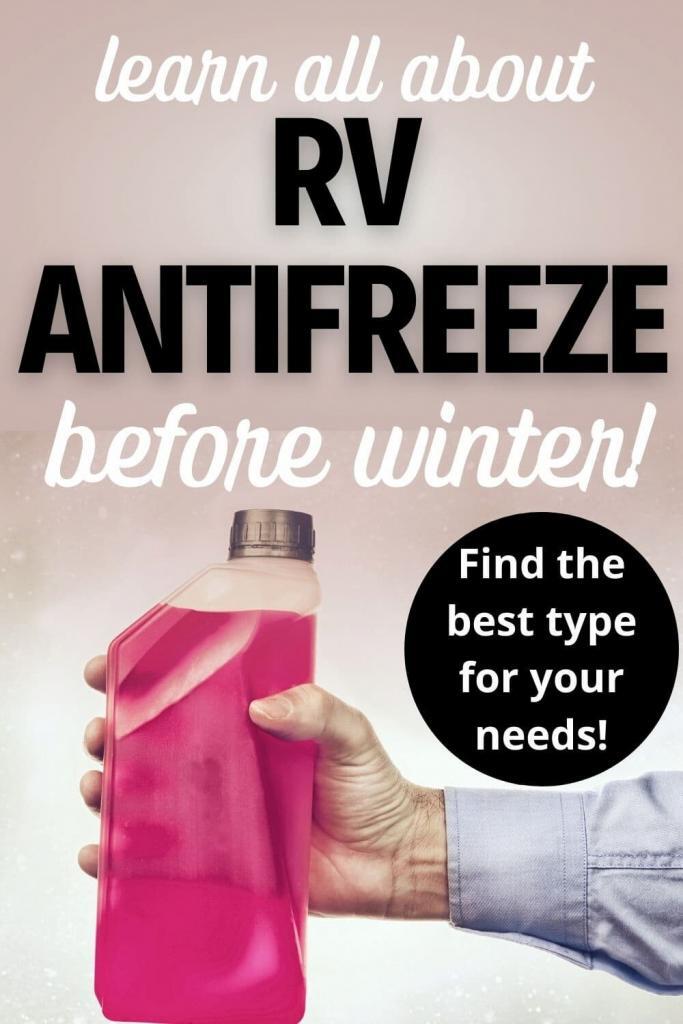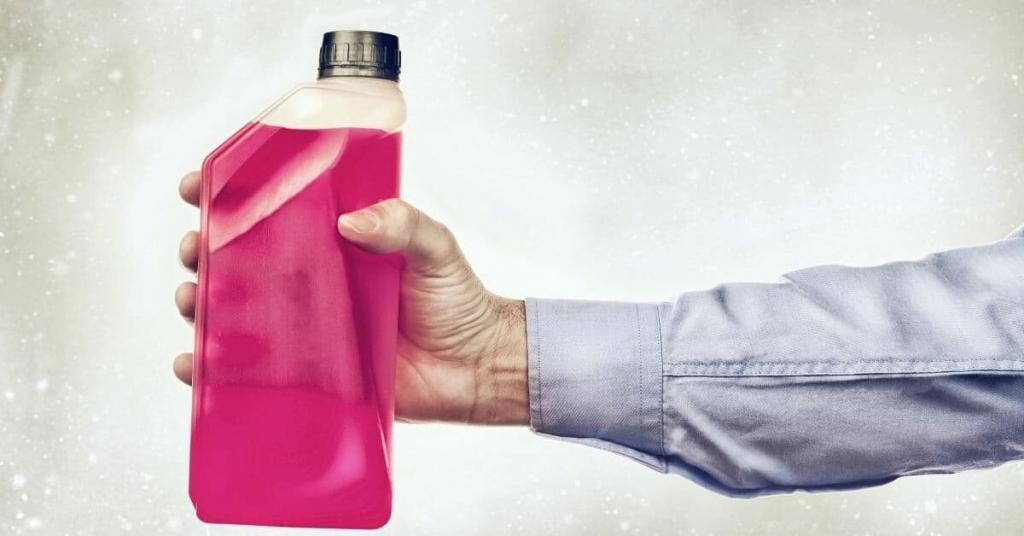If you own a recreational vehicle and are responsible for maintenance, it’s a good idea to know everything you can about RV antifreeze!
The right antifreeze is essential for winterizing your RV’s plumbing system and protecting them from freezing or bursting when the temperature drops.
If you don’t properly prepare your RV or take freeze protection seriously, you’ll likely end up having expensive repairs to make or even irreversible damage done to your camper.
And no one wants that!
First time RV owners often ask questions such as:
What is RV antifreeze?
What are the different types of antifreeze?
Which products are best?
How do you safely dispose of antifreeze?
If you are asking the same questions, stick around because we’re going to tackle all of these important questions and more in this short but complete guide to RV antifreeze!
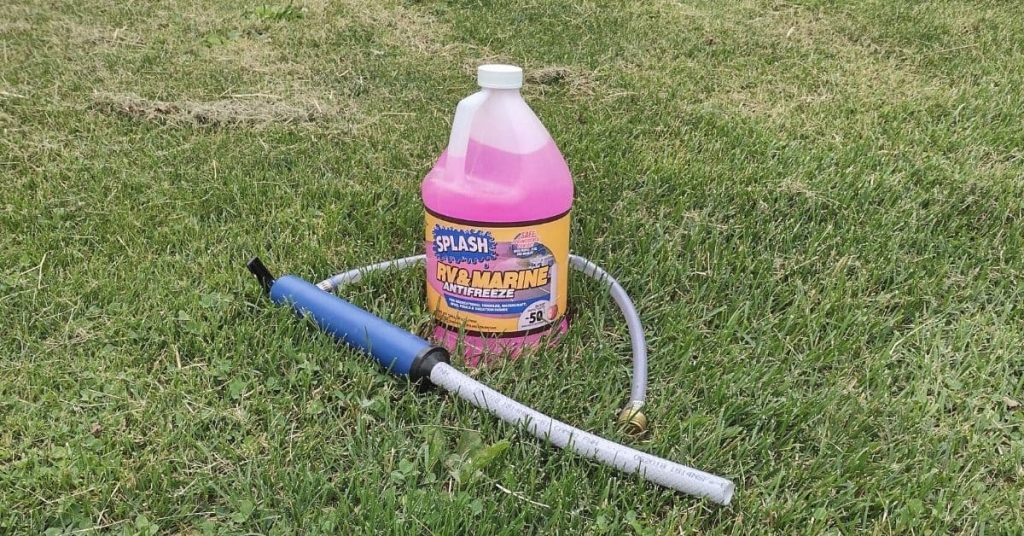
This post may contain affiliate links, which means I’ll receive a commission if you purchase through my links, at no extra cost to you. Please read full disclosure for more information.
What Is RV Antifreeze?
RV antifreeze is a non-toxic formula made specifically for preparing an RV’s plumping system from freezing in cold seasons.
It prepares the pipes for cold temperatures and prevents the fluids inside them from freezing, which prevents the pipes themselves from expanding, and ultimately bursting.
Certain types of non-toxic antifreeze can also be used in the sewer systems and freshwater systems of RVs or travel trailers.
It is not like automotive antifreeze, which is incredibly toxic and formulated for protecting the cooling systems in engines from a host of problems like freezing and overheating.
It’s important to not confuse these products as they are two different types of antifreeze, serve very different purposes, and cannot be used interchangeably.
Different Types Of RV Antifreeze
There are several different types of RV antifreeze with different benefits, and each has its pros and cons.
ETHANOL-BASED
Ethanol-based RV antifreeze is usually the most affordable type you can buy and is formulated with alcohol to raise the freezing point of the water inside the pipes or tanks, which keeps them from expanding and exploding.
There are several downsides and safety concerns to consider when using ethanol-based antifreeze formulas, though.
Because this type of RV antifreeze is actually toxic, it can cause your water to taste and smell bad, which requires the lines to be completely flushed out when it’s time to de-winterize.
It can even end up drying out and shortening the life of the seals due to the alcohol.
For these reasons, it’s best to use with quest or pex water lines only.
Ethanol-based antifreeze is also highly flammable and shouldn’t be used around pilot lights.
So while ethanol antifreeze can be more budget-friendly at first, it may end up actually costing you money and hassle, which is why it’s best to use it only as a last resort.
PROPYLENE-GLYCOL-BASED
This antifreeze is formulated with propylene glycol, which is a synthetic form of alcohol. It works the same way as ethanol-based ones by raising the freezing point of the water, but is actually odorless and tasteless, unlike ethanol-based formulas.
This type of antifreeze is also non-toxic and the safest formula for RV use.
It’s great at keeping rubber seals moisturized, prolonging their life instead of shortening them, which is an added benefit of using propylene-glycol-based over ethanol-based.
Propylene-glycol-based antifreeze is also non-flammable unlike other formulas and is available in -50 and -100 degree temperature ratings (also called burst protection).
For these reasons, it’s pretty obvious why this type of RV antifreeze is a better choice for protecting your RV’s plumbing system and tanks.
PROPYLENE-ETHANOL BLEND
You get the most middle ground of RV antifreeze types with a propylene-ethanol-blend which as the name implies, uses a formula composed of both ethanol and propylene.
You’ll still get the benefits of protecting your plumbing and water systems, even in -40 degree temps, but because it’s partly made with alcohol, it can still taint your water and dry out rubber seals.
It’s also still highly flammable and shouldn’t be used around parts like pilot lights.
It’s also usually non-toxic depending on the specific blend and is a good second choice when you can’t get just the propylene-glycol-based RV
antifreeze.
Best RV Antifreeze Brands
There are several popular name brands of RV antifreeze, and then there are off-brand options as well.
When in doubt, go with a well-known name like PEAK or Camco, or consult your RV manufacturer for their recommendation.
Just a quick note– It should go without saying, but it’s incredibly important to keep RV antifreeze out of reach and away from children.
These products often come in bright colors that resemble fruit juices, and some kids may mistake them for a gallon of juice.
Ok, back to the best antifreeze products.
Some of the most trusted brands of RV antifreeze are:
PEAK
Camco
RecPro
Splash
Highest Rated and Most Recommended RV Antifreeze Products
Camco RV Antifreeze Concentrate
One jug of Camco 36-ounce concentrate makes a full gallon of antifreeze.
It’s non-toxic and has burst protection of -50 degrees Fahrenheit.
It does need to be diluted and doesn’t have a long shelf life, though.
Prestone RV and Marine Antifreeze

Peak RV antifreeze is a versatile and non-toxic product that comes ready to use.
Because it’s Generally Recognized as Safe (GRAS) by the FDA and is non-toxic, it can even be used in swimming pools filtration systems and drinking water systems.
It has burst protection of -100 degrees Fahrenheit and even protects pipes from rusting, corroding, or scaling. Some say it has a strong odor, though so that may be worth noting if you’re sensitive to smells.
RecPro RV Antifreeze

RecPro RV antifreeze is another option that is formulated with a propylene-glycol-base and claims to be safe for water systems, pool filtration systems, and even your home’s sewer and plumbing systems.
It’s also safe to use with brass, plastic, and steel plumbing lines. Like most other RV antifreeze brands, this can be used up to -50 degrees Fahrenheit.
This option usually comes in a pack of two or more, which may or may not be convenient depending on your needs.
Splash RV and Marine Antifreeze

Splash Rv antifreeze was formulated with more than just RV’s in mind. This versatile antifreeze is safe for ATVs, motorcycles, and speed boats.
It offers protection up to -50 degrees Fahrenheit and claims to be safe for your water lines as well.
Camco RV Winter Kit

This kit is great for RV owners! It’s an all-in-one winterization kit that offers more than just RV antifreeze.
This handy bundle comes with 10 pieces that will keep your RV pipes from freezing while also keeping the living space from getting musty or stinky during the cold months when it’s stored away.
It comes with three, 32-ounce bottles of Premium Ban Frost Antifreeze Concentrate (it’s a non-toxic, propylene-glycol-based formula and also protects against corrosion), a hand pump, three different dehumidifiers (one mini, one hanging, and one refillable), a fridge door stay, one moisture absorber, one blowout plug, and a 5-gallon bucket.
RV Antifreeze FAQs
Now that you know the basics of RV antifreeze, you may have some questions. I’ll do my best to give a helpful answer 🙂
How Much Antifreeze Do I Need?
Typically, most RVs need somewhere between 2-3 gallons depending on the size of your camper.
It’s not necessary to fill your tanks with antifreeze, you just need to run it through after you’ve emptied the tanks to protect seals, valves, and keep everything from freezing.
Is RV Antifreeze Toxic To Plants Or Animals?
In short, it depends.
As discussed above, ethanol-based formulas are definitely more toxic than propylene-glycol-based and should be used with caution.
The specific formulas in each RV antifreeze vary due to different amounts and types of ingredients, so it’s best to assume that they are all toxic to some degree, especially over a period of time.
Even the non-toxic formulas of RV antifreeze can still be harmful when ingested (even in small amounts) and depending on the primary ingredients, can be harmful to plants as well.
To be on the safe side, it’s always best to treat all RV antifreeze carefully and keep away from children, animals, and plants.
At What Temperatures Do You Need RV Antifreeze?
To prevent any damage to your pipes or tanks, it’s best to add RV antifreeze before the outside temps reach 32 degrees Fahrenheit and water freezes.
Your RV’s pipes can burst even in a couple of hours of cold temps, so don’t wait to winterize your RV!
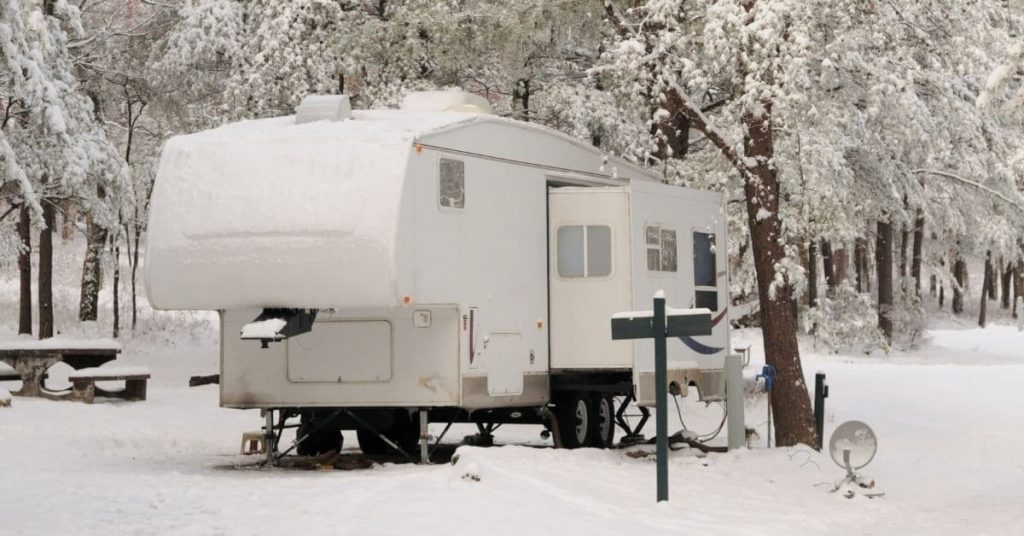
Can I Put RV Antifreeze In My Freshwater Tank?
Different sources will claim that it is completely safe to put RV antifreeze into your freshwater tank while others say you should avoid it.
In theory, it is safe to winterize your freshwater tank with RV antifreeze, but it’s best to only use propylene-glycol-based formulas since it’s the only product considered non-toxic and the all-around safest option.
You need to make sure you completely flush the fresh water tank while de-winterizing your RV and before using the tank, though.
This is very important!
Are There Alternatives To Using RV Antifreeze?
There are alternatives to using antifreeze in your RV, but all have pros and cons so please be sure to research them well before deciding.
Using an air compressor to rid plumbing and tanks of any water and moisture is an alternative to RV antifreeze when it comes to winterizing your plumbing and tanks, but it has several disadvantages.
Even though most of the water will leave the pipes thanks to the force of the air, there’s still a high chance that residual water and moisture will remain and collect at low spots in tanks or pipes.
In the case that it does, your plumbing and water systems are of course at risk of freezing and bursting, especially in long and cold winters.
Can I Use Vodka To Winterize My RV?
Another alternative to RV antifreeze that some suggest is cheap vodka.
I can see how this probably works (as long as you don’t have a super cold winter) and could be an attractive alternative to antifreeze but, let’s be honest, even cheap vodka isn’t that cheap!
Also, if you have a newer RV, using something other than what the manufacturer recommends could void any warranty.
So be sure to check into that before making your final decision.
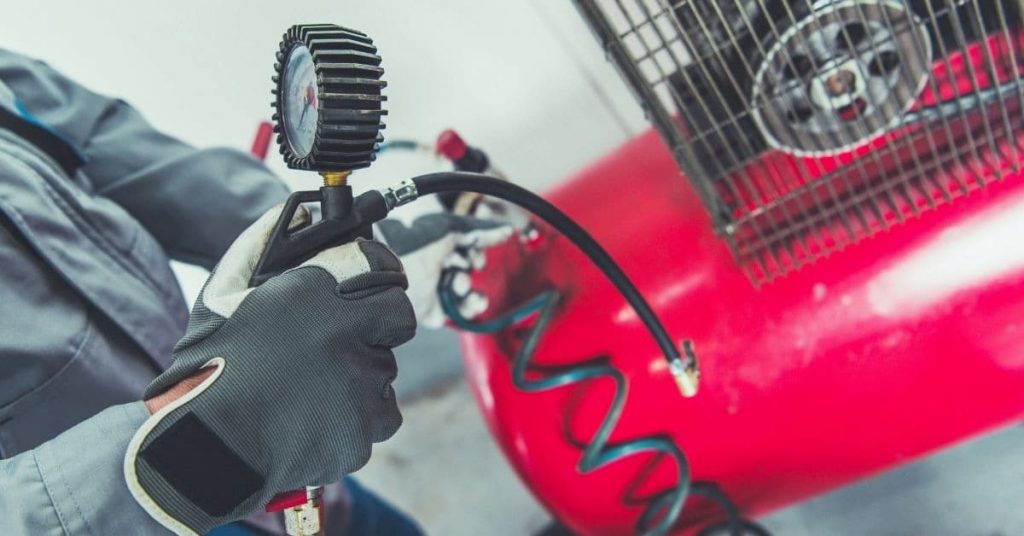
How Do You Dispose Of Used RV Antifreeze? Can You Dump It On The Ground?
Again, different sources claim different things. Some say that you can dump RV antifreeze on the ground, down the drain, or down the toilet while others advise against it.
In my opinion, it is best to take any used products to a facility that accepts them instead of dumping it anywhere (yes, even the non-toxic, propylene-glycol-based formulas).
Even the non-toxic RV antifreeze can be harmful to children, plants, and animals, depending on the specific formulas and how much they ingest.
It can also disrupt the sewage treatment when dumped down the toilet or drain and taint surrounding water and grounds.
For these reasons, it’s best to use exercise caution and go the extra mile to dispose of it the right way.
To properly dispose of used RV antifreeze, you can call your local waste management facility, recycling center, RV manufacturer, mechanic shops, or auto stores and ask for their recommendations.
Some facilities charge a fee to take your used antifreeze while others will take it for free.
In either case, it’s well worth it to make sure you’re not harming anyone or polluting any water or ground that it may come into contact with it.
How Do I Clean Up Spilled RV Antifreeze?
Cleaning up an antifreeze spill is pretty easy.
Just put on some gloves (and a mask if you need one), pour something safe, non-reactive, and absorbent like kitty litter, sand, or baking soda over the spill, then cover with paper towels.
After an hour or so, pick up the mess with another clean paper towel, put it in a sealable bag, and throw it away.
Then scrub the surface area with some soap and water and allow to air dry.
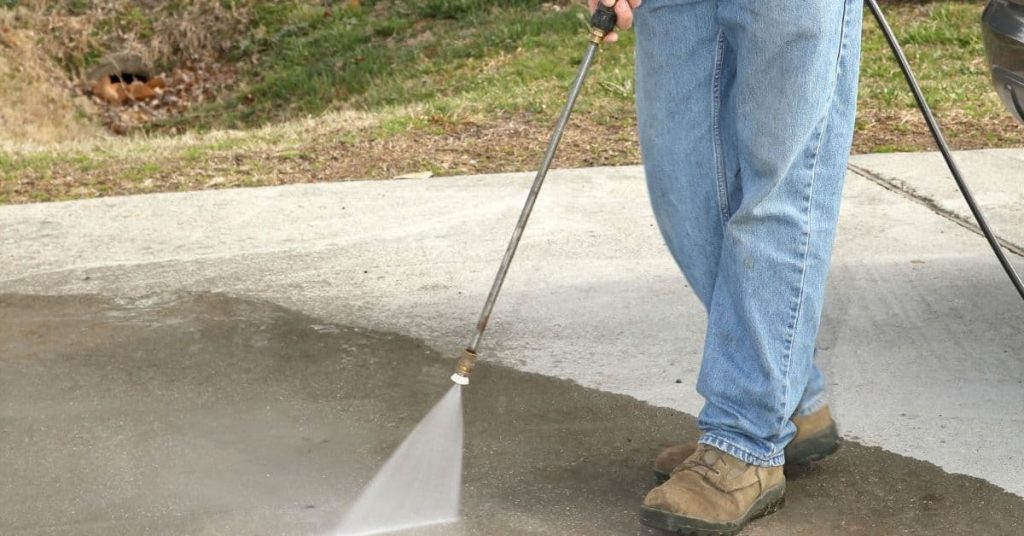
Can RV Antifreeze Be Reused?
It’s best to avoid reusing any RV antifreeze, and instead properly dispose of it as mentioned above.
Even if your used antifreeze looks clean enough to reuse, it’s going to be diluted with water from being flushed out during the de-winterization process, and will not be as effective at protecting your plumbing or tank systems from freezing.
Reusing RV antifreeze may sound like a good way to upcycle and save some money, but it’s not worth the risk.
Additional Notes And Considerations
There are some other things you should consider when buying, using, and storing RV antifreeze.
1. Always keep all RV antifreeze away from children, pets, plants, and food.
Even the non-toxic and biodegradable ones can be harmful, especially the concentrated formulas.
RV antifreeze also tends to look fruity and is colorful, which is enticing to kids and pets.
2. Be sure to mix concentrated formulas per directions
You want to be sure that it is mixed properly so that the antifreeze works as intended.
3. Never mix different antifreeze solutions
For best results do not mix different brands or mix old with new solutions
4. Always completely flush out antifreeze before adding new solutions
Be sure to thoroughly flush all lines before use or before adding new antifreeze to your RV.
5. Double-check that the RV antifreeze you choose is safe for your pipes and whatever else you intend on using it for like freshwater tanks
Most RV antifreeze has burst protection of -50 degrees Fahrenheit while others have a rating up to -100 degrees Fahrenheit so make sure you get
one with the right temperature rating for your climate.
6. Ethanol-based RV antifreeze is extremely flammable and toxic and should be used as a last resort when possible
It should also be kept away from things like pilot lights, and out of reach of children and pets.
The safest and most beneficial solution is a propylene-glycol-based antifreeze since it is both eco-friendly and FDA-approved, and serves as a lubricant for rubber seals and more.
It is well worth the extra cost compared to the cheaper options that are ethanol-based. Concentrated formulas usually have a longer shelf life than ready-to-use solutions and are more cost-effective, too.
They require mixing, though which is an added step. Pre-diluted solutions are ready-to-use and eliminate an extra step of preparing it yourself as well as eliminating any risk of messing up the strength of the solution which is a possibility when using concentrated formulas.
7. Choose trusted brands and the most recommended RV antifreeze solutions
Quality is important when it comes to winterizing your plumbing and water systems.
Some formulas come with added ingredients that help protect against algae, corrosion, rusting, and more while also conditioning rubber seals –
all of which preserve your plumbing and water systems.
Last Thoughts About RV Antifreeze
Using RV antifreeze is an essential part of winterizing your RV’s plumbing and water systems, and should be used before outside temps get to 32 degrees Fahrenheit to prevent any freezing and bursting pipes.
The best all-around, non-toxic RV antifreeze is propylene-glycol-based formulas for both safety concerns and benefits to your RV.
It’s also incredibly important to dispose of any new or used RV antifreeze properly, no matter what type or brand.
All in all, there’s a lot to consider when winterizing your RV’s plumbing and water systems with antifreeze, so be sure you have thoroughly researched it and are prepared for winterizing your RV the right way.
Related Articles
- RV Covers: Pros, Cons & Best Options
- RV Tire Covers: Are They Necessary?
- How To Quickly & Easily Sanitize An RV Water Tank
Be sure to check out other articles about RV gear and our favorite product page for more tips and helpful info!
